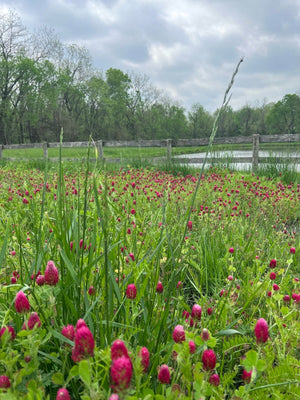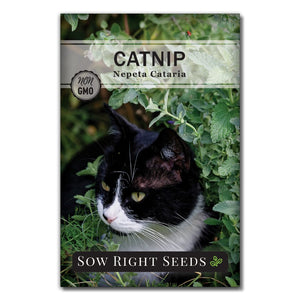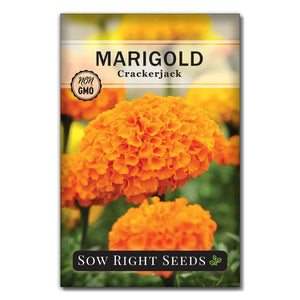5 Natural Remedies for Non-Toxic Pest Control in the Garden
PestsIf you’re looking for more natural ways to keep your garden free of pests, you’re not alone. Many people are turning away from harsh chemical maintenance as much as possible in favor of more holistic approaches that help build a healthy garden and ecosystem.

Let’s look at why you might want to turn to natural remedies before diving into the how-to.
Why Not Just Use Pesticides?
There are many reasons to avoid synthetic pesticides. If you do decide to use pesticides, we encourage you to only consider them as a last resort, using them sparingly only when all else has failed. Here are a few reasons why:
- Human health - Different pesticides have been linked to various diseases and conditions in humans. If you do use pesticides, make sure to wash your vegetables well before consuming.
- Pollinators - What kills bad insects can often kill good insects. Natural options are much less dangerous for vulnerable honey bee and monarch butterfly populations.
- Pets - Are you noticing a trend? It’s probably not very surprising that something poisonous to insects can also be harmful to other living things.
- Soil - Pesticides can linger in the soil for years. This can harm beneficial soil organisms and lead to unhealthy, sterile soil.
- Pollution - When it rains, pesticides can be washed away into the sewer drains or into local water sources. Avoiding pesticide use helps you to keep your entire neighborhood healthy and thriving.
If you’re convinced to try some more natural remedies to keep your pest population in check, great! Let’s look at the options.

Natural Methods of Pest Control
Prevention: Keep Pests Out
Preventing pests is your first and best strategy to keep pests out naturally. It can’t solve every problem, but starting with a garden that is inhospitable to pests goes a long way.
Use effective barriers for pest control. Fences, row covers, plant cages, and netting can keep pests out during critical stages of plant development. These are especially helpful for deer, rodents, and birds, but they also can be used to keep certain insects from devouring your seedlings.

Garden Hygiene
Good garden hygiene is a must at all times. Pests can set up shop in a garden that hasn’t been well-maintained. Remove debris as needed, and pull out any weak plants that you see have been overtaken with pests promptly. Completely clear your garden at the end of the season because insects will gladly overwinter in old plant debris to bug you again next year.
Mulching around the base of your plants is another type of barrier to keep pests out. Do your research to make sure the mulch you choose is right for the type of pests you’re trying to keep out. Straw mulch can reduce the number of cucumber beetles in your garden, for example.
Crop Rotation
Crop rotation is also important for keeping pests from returning to the same spot year after year. Crop rotation has many other benefits, too. It will help protect your plants from disease and keep your soil from becoming depleted or unbalanced in nutrients.

Companion Planting
Attract good bugs and deter bad ones with companion plants. Interplanting and companion planting can help keep pest populations low. In general, plant diversity discourages any one pest from dominating your garden. Intercropping your vegetables with companion plants will deter pests while attracting predator insects and hunting spiders, which will help keep the pest population down.
A great example of an insect you want in your garden is the parasitic wasp that disrupts the tomato hornworm life cycle. This wasp is attracted by buckwheat and sweet alyssum. Ladybugs are also excellent helpers by devouring aphids.
In general, choosing herbs and flowering plants with smaller blooms are especially helpful for attracting pest predators and pollinators. Some all-around great companion plants for attracting good bugs and repelling bad ones include marigolds, nasturtium, yarrow, and thyme.
Manual Removal
Removing the pests manually can be a bit time-intensive, but sometimes it’s your best bet. Frequent inspection of your plants, especially underneath the leaves and in places where pests like to plant their eggs, will save more plants than almost any other method. Take a bowl of soapy water and a pair of gloves and inspect your plants carefully, drowning or crushing any insects or eggs as you go. This method is effective on Japanese beetles, tomato hornworms, and other pests.
5 Natural Pesticide Options
If pest populations get out of control, are you just out of luck? Of course not! There are several natural alternatives to chemical pesticides that work well without the toxicity and damage to humans, animals, and the environment.

Here are some natural and effective options to consider:
Diatomaceous Earth
Diatomaceous earth is a powder made from the fossilized remains of diatoms. It can be effective against a variety of crawling insects. Always use food-grade diatomaceous earth and avoid inhaling the fine powder.
Neem Oil
Neem oil can be used as an insecticide, fungicide, and nematode killer. Neem oil won’t harm beneficial insects or birds as long as you avoid using it directly on blooming plants.
Bacillus thuringiensis (Bt)
Bt is a naturally occurring bacterium that's deadly to many caterpillars and larvae. It's safe for humans and animals. However, the jury is still out about whether it harms bees. Avoid using it on blooming plants.
Insecticidal Soap
Insecticidal soap is a safe option to control a variety of soft-bodied insects and pests that can be applied directly to plant leaves. Sensitive plants can be damaged by high concentrations of insecticidal soap, so follow directions carefully.
Pyrethrin
Pyrethrin is a natural insecticide made from chrysanthemum flowers. It's effective against a variety of insects, but it’s also toxic to honey bees. If you use pyrethrin, avoid flowering plants.
The fight against pests can feel discouraging but don’t give up. The savvy gardener has a wide range of effective weapons for fighting pest invasions.
Written by Teresa Chandler









Leave a comment